Is It Okay to Drink Gatorade Zero Every Day? Here’s What the Science Says
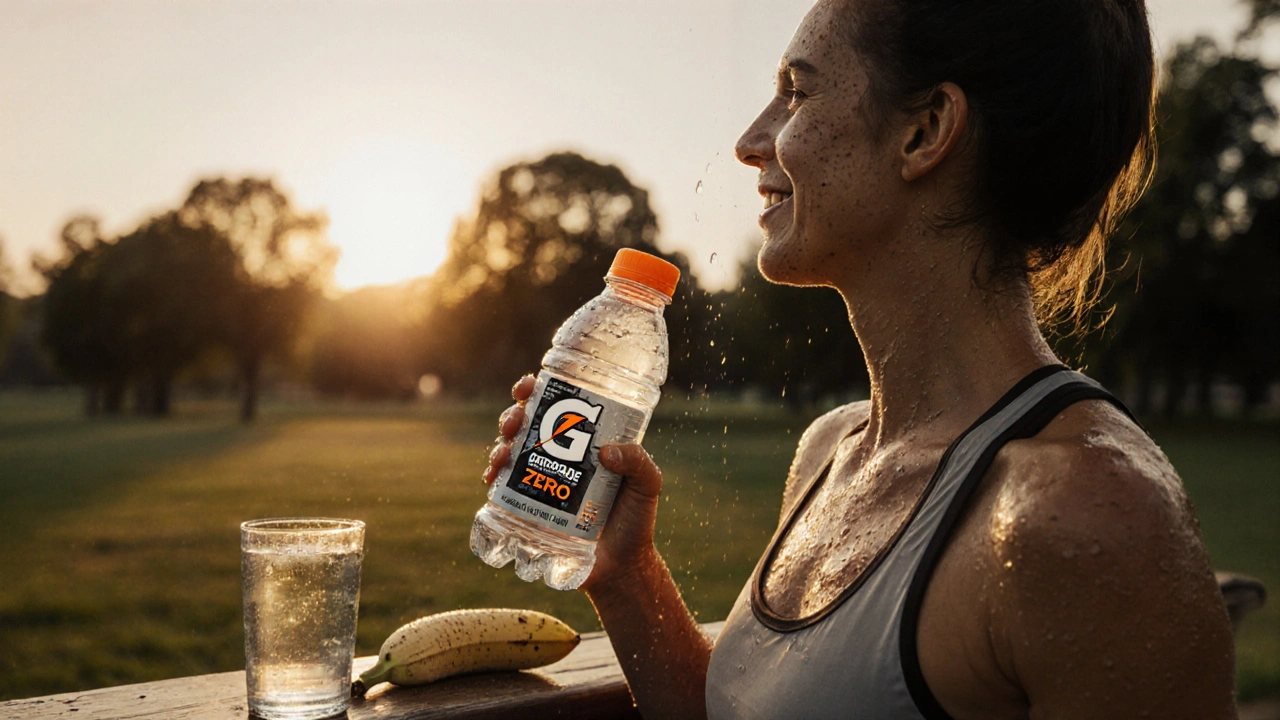
Drinking Gatorade Zero every day might seem harmless-after all, it has no sugar, no calories, and promises to replace electrolytes lost during workouts. But if you’re sipping it after every run, during work meetings, or even as a replacement for water, you’re asking a bigger question than you think: Is it actually good for you?
What’s Really in Gatorade Zero?
Gatorade Zero isn’t just sugar-free Gatorade. It’s a reformulated drink designed to mimic the original’s taste and electrolyte profile without the carbs. A 20-ounce bottle contains:
- 0 grams of sugar
- 0 calories
- 160 mg sodium
- 50 mg potassium
- Artificial sweeteners: sucralose and acesulfame potassium
- Artificial colors (like Blue 1, Red 40)
That’s about the same sodium as a small bag of pretzels, and nearly 7% of your daily recommended limit in one bottle. Potassium is low compared to what you’d get from a banana or a baked potato. The sweeteners? They’re there to trick your taste buds into thinking it’s sugary without the calories.
Who Actually Needs Gatorade Zero?
Not everyone. Gatorade Zero was made for people who:
- Do intense, prolonged exercise (over 60 minutes) in hot conditions
- Are losing a lot of sweat and electrolytes
- Need quick sodium and potassium replacement to avoid cramps or dizziness
For most people who work out for 30-45 minutes, drink water. Your body doesn’t need extra sodium. If you’re sitting at a desk all day and chugging Gatorade Zero because you think it’s "healthier" than soda, you’re missing the point. It’s not a health drink. It’s a sports drink with no sugar.
Artificial Sweeteners: Harmless or Hidden Risk?
The big concern with daily Gatorade Zero isn’t the sodium-it’s the sweeteners. Sucralose and acesulfame potassium are FDA-approved, but that doesn’t mean they’re harmless long-term.
A 2023 study in the Journal of Clinical Nutrition followed over 10,000 adults for 8 years and found that those who consumed artificial sweeteners daily had a 14% higher risk of developing high blood pressure compared to those who didn’t. Another study from the University of Calgary showed that daily sucralose intake altered gut bacteria in healthy volunteers within just two weeks, reducing their ability to process glucose.
These aren’t scare tactics. They’re real, peer-reviewed findings. Your gut doesn’t care if the sweetener has zero calories. It reacts to the chemical signal. And over time, that can mess with insulin response, hunger signals, and even your cravings.
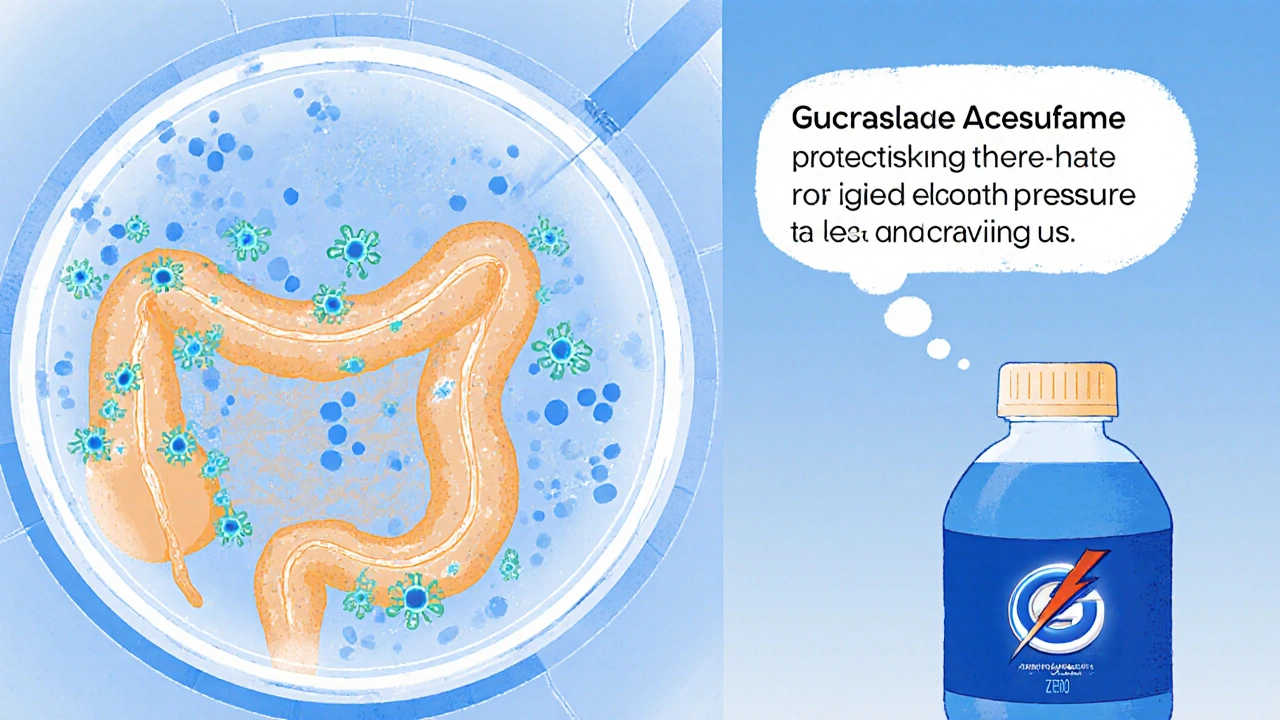
Electrolyte Imbalance: More Isn’t Better
Drinking Gatorade Zero every day means you’re getting a steady drip of sodium-160 mg per bottle. If you’re drinking two or three a day, that’s 320-480 mg extra sodium, on top of what’s in your food.
Most Americans already consume over 3,400 mg of sodium daily, far above the 2,300 mg limit recommended by the American Heart Association. Adding Gatorade Zero on top of processed snacks, canned soups, and restaurant meals pushes you closer to the danger zone for high blood pressure, kidney strain, and fluid retention.
Potassium is low in Gatorade Zero. That’s a problem because sodium and potassium work together. Too much sodium without enough potassium increases your risk of heart issues. You’d need to eat five bananas a day to match the potassium you get from a single serving of coconut water. Gatorade Zero doesn’t fix that imbalance.
What Happens When You Drink It Daily?
Here’s what real people experience when they drink Gatorade Zero every day for months:
- Increased thirst - The sodium pulls water out of your cells, making you feel dehydrated even when you’re drinking plenty.
- Headaches or brain fog - Some people report this after switching from sugary drinks to artificial sweeteners. It’s likely tied to blood sugar swings or neural responses to the chemicals.
- Cravings for sweets - Your brain expects sugar when it tastes sweetness. When it doesn’t get it, it craves more.
- Digestive discomfort - Acesulfame potassium can cause bloating or nausea in sensitive people, especially with daily use.
None of this is guaranteed. But if you’re drinking it daily, you’re not just hydrating-you’re exposing your body to a steady chemical input with long-term, poorly understood effects.
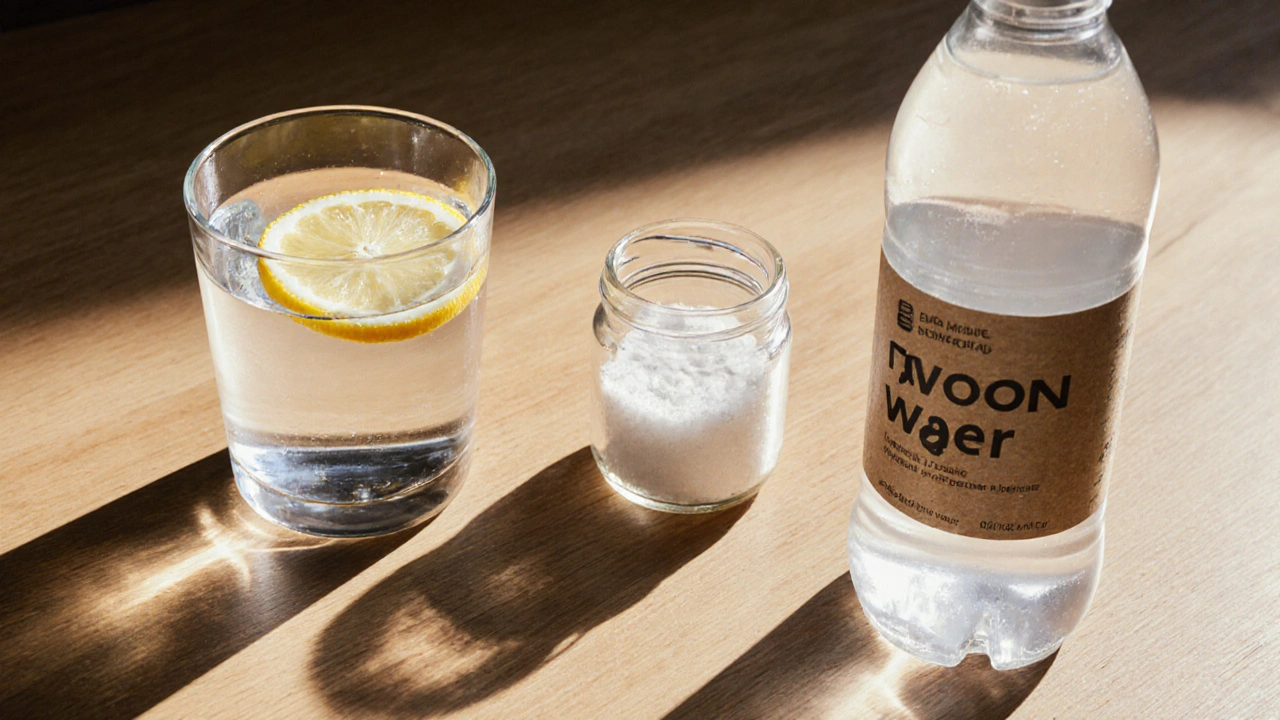
What Should You Drink Instead?
If you’re active and need electrolytes, here are better options:
- Water + a pinch of sea salt - Add 1/8 tsp of unrefined salt to a liter of water. It gives you sodium and trace minerals without artificial junk.
- Coconut water - Natural potassium, no additives. Check the label-some brands add sugar or flavoring.
- Homemade electrolyte drink - Mix water, lemon juice, a teaspoon of honey (or maple syrup), and a pinch of salt. You control what goes in.
- Electrolyte tablets - Like Nuun or LMNT. They have fewer additives than Gatorade Zero and often use natural flavors.
If you’re just thirsty, water is still the best choice. Your body evolved to use water. It doesn’t need flavor enhancers or artificial sweeteners to function.
Is Gatorade Zero Better Than Soda?
Yes. Absolutely. If you’re choosing between Gatorade Zero and a can of Coke, pick the zero. But that’s not the right comparison. The real question is: Should you be drinking either one daily?
Neither is a health drink. Soda is full of sugar and empty calories. Gatorade Zero is full of chemicals and unnecessary sodium. Both are products designed to make you keep buying them-not to improve your health.
If you’re trying to quit soda, Gatorade Zero can be a stepping stone. But don’t make it your new habit. Use it to transition, then move on to water, tea, or homemade drinks.
Bottom Line: Should You Drink Gatorade Zero Every Day?
No-not if you’re not an athlete training for hours in the heat. For most people, daily use is unnecessary and potentially harmful.
It’s fine occasionally: after a long run in 90-degree weather, during a multi-hour hike, or if you’re sick and losing fluids. But drinking it every day for taste, habit, or the illusion of health? That’s a bad trade-off.
Your body doesn’t need artificial sweeteners. It doesn’t need extra sodium unless you’re sweating buckets. And it definitely doesn’t need chemicals just to make water taste better.
Stick to water. Add lemon. Add salt. Add fruit. But don’t rely on a bottle labeled "zero" to be your daily fix. It’s not a health product. It’s a sports drink with a marketing label.
Can Gatorade Zero cause weight gain?
Gatorade Zero has zero calories, so it won’t directly cause weight gain. But artificial sweeteners like sucralose may increase cravings for sweet foods, leading to overeating later. Some studies link daily artificial sweetener use to higher belly fat and insulin resistance, which can contribute to weight gain over time.
Is Gatorade Zero bad for your kidneys?
There’s no direct evidence that Gatorade Zero damages healthy kidneys. But the high sodium content (160 mg per bottle) adds to your daily load. If you already have kidney issues or high blood pressure, extra sodium can strain your kidneys. Drink it sparingly if you have any kidney concerns.
Does Gatorade Zero dehydrate you?
No-it’s designed to hydrate. But drinking it daily without enough water can make you feel dehydrated because the sodium pulls water into your bloodstream, leaving your cells slightly dry. You still need plain water to properly hydrate your tissues.
Is Gatorade Zero okay for kids?
Not regularly. Kids don’t lose enough electrolytes through normal activity to need a sports drink. Artificial sweeteners and colors may affect behavior or appetite in sensitive children. Water and whole foods are far better for hydration and nutrition.
What’s the healthiest alternative to Gatorade Zero?
The healthiest alternative is plain water with a pinch of sea salt and a squeeze of lemon. For longer workouts, coconut water (unsweetened) or electrolyte tablets like Nuun (with no artificial sweeteners) are better choices. Homemade drinks with natural ingredients give you control and avoid hidden chemicals.

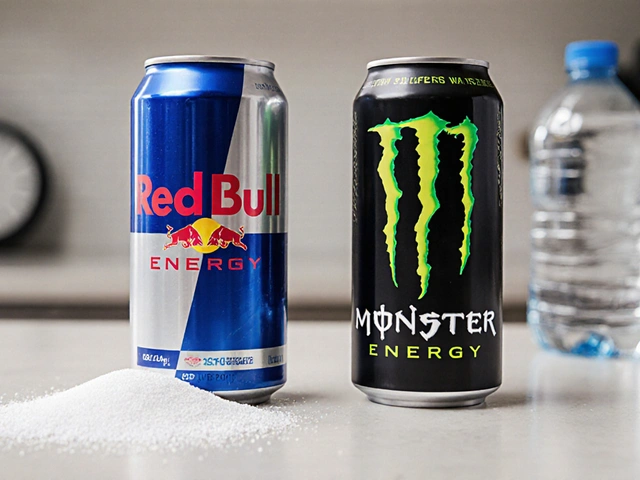

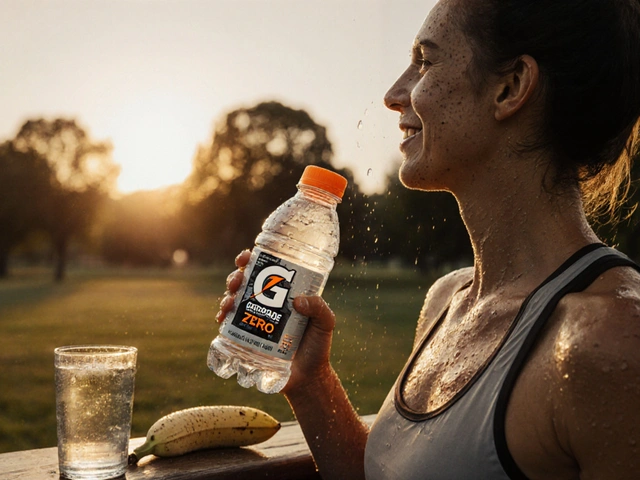

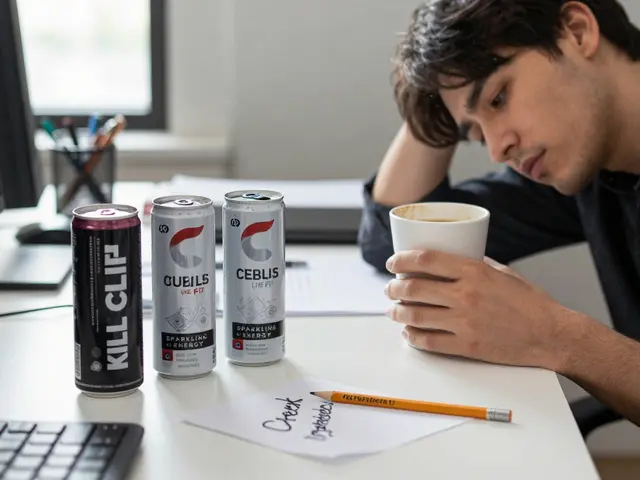
Comments (11)
Teja kumar Baliga
17 Nov 2025
I grew up in India where we drink nimbu pani with a pinch of salt after playing cricket all day. No Gatorade needed. Water + salt + lemon works just fine. Your body knows what it needs.
k arnold
18 Nov 2025
Wow. So Gatorade Zero is bad because it has chemicals? Next you'll tell me oxygen is dangerous because it has atoms.
Tiffany Ho
19 Nov 2025
I used to drink this every day after yoga and honestly I felt weird after a while. Like my mouth was always dry even when I drank a lot. Switched to water with lemon and now I feel way better. No more headaches.
michael Melanson
21 Nov 2025
The sodium content is the real issue here. Most people don't realize how much sodium they're already consuming. Adding another 160mg per bottle on top of processed food is just asking for trouble.
lucia burton
22 Nov 2025
Let's not sugarcoat this-the artificial sweeteners in Gatorade Zero are neuroactive compounds that interfere with the gut-brain axis, potentially dysregulating ghrelin and leptin signaling pathways, which in turn can promote metabolic inefficiency and reward-seeking behavior patterns that manifest as increased caloric intake from other sources despite the beverage's zero-calorie designation. This isn't marketing-it's physiology.
Denise Young
23 Nov 2025
Oh so now we're supposed to be scared of sucralose because some study says it might mess with your gut? Meanwhile, people are still chugging Diet Coke and calling it 'diet.' You're not saving yourself with Gatorade Zero-you're just swapping one addiction for another. Water. Just drink water.
Sam Rittenhouse
25 Nov 2025
I used to drink two bottles a day after my morning runs. Then I started getting headaches and constant cravings for candy. I didn't connect the dots until I quit. Now I drink water with a slice of orange. My energy is steadier. My mind is clearer. It wasn't about willpower-it was about chemistry.
Peter Reynolds
26 Nov 2025
I get why people use it. It tastes better than water. But I don't see the point unless you're sweating buckets. For regular workouts, water is enough. And if you need flavor, add lemon or mint. Simple.
Fred Edwords
27 Nov 2025
It's important to note that while the FDA has approved sucralose and acesulfame potassium for consumption, long-term, chronic ingestion may still pose risks that are not yet fully understood. Additionally, the cumulative effect of daily sodium intake from multiple sources-including processed foods, restaurant meals, and sports beverages-should not be underestimated. The American Heart Association recommends a maximum of 2,300 mg per day, and many individuals exceed this without realizing it.
Sarah McWhirter
28 Nov 2025
Have you ever wondered why Gatorade Zero tastes exactly like the original but has no sugar? Because they want you to believe you're making a healthy choice while still being addicted to sweetness. It's not science-it's corporate manipulation. They're not selling hydration. They're selling dopamine.
Ananya Sharma
30 Nov 2025
You're all missing the point. This isn't about Gatorade Zero-it's about how we've been conditioned to think we need products to hydrate. We used to drink water, tea, milk, coconut water, even buttermilk. Now we need a bottle with a label that says 'zero' to feel like we're doing something right. We've lost touch with basic nutrition because corporations made it profitable to overcomplicate it. And now we're scared of chemicals in a drink while eating processed meals with 17 unpronounceable ingredients. Hypocrisy. The real problem is the system-not the drink.